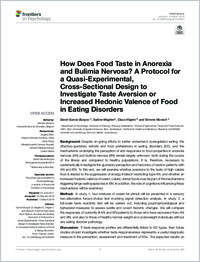How Does Food Taste in Anorexia and Bulimia Nervosa? : A Protocol for a Quasi-Experimental, Cross-Sectional Design to Investigate Taste Aversion or Increased Hedonic Valence of Food in Eating Disorders
- Garcia-Burgos, David Universität Fribourg, Schweiz
- Maglieri, Sabine Bern University of Applied Sciences
- Vögele, Claus University of Luxembourg
- Munsch, Simone Universität Fribourg, Schweiz
-
13.03.2018
Published in:
- Frontiers in Psychology. - 2018, vol. 9, no. 264, p. 1-12
English
Background: Despite on-going efforts to better understand dysregulated eating, the olfactory-gustatory deficits and food preferences in eating disorders (ED), and the mechanisms underlying the perception of and responses to food properties in anorexia nervosa (AN) and bulimia nervosa (BN) remain largely unknown; both during the course of the illness and compared to healthy populations. It is, therefore, necessary to systematically investigate the gustatory perception and hedonics of taste in patients with AN and BN. To this end, we will examine whether aversions to the taste of high-calorie food is related to the suppression of energy intake in restricting-type AN, and whether an increased hedonic valence of sweet, caloric-dense foods may be part of the mechanisms triggering binge-eating episodes in BN. In addition, the role of cognitions influencing these mechanisms will be examined. Method: In study 1, four mixtures of sweet-fat stimuli will be presented in a sensory two-alternative forced-choice test involving signal detection analysis. In study 2, a full-scale taste reactivity test will be carried out, including psychophysiological and behavioral measures to assess subtle and covert hedonic changes. We will compare the responses of currently-ill AN and BN patients to those who have recovered from AN and BN, and also to those of healthy normal-weight and underweight individuals without any eating disorder pathology. Discussion: If taste response profiles are differentially linked to ED types, then future studies should investigate whether taste responsiveness represents a useful diagnostic measure in the prevention, assessment and treatment of EDs. The expected results on cognitive mechanisms in the top-down processes of food hedonics will complement current models and contribute to the refinement of interventions to change cognitive aspects of taste aversions, to establish functional food preferences and to better manage food cravings associated with binge-eating episodes. No trial registration was required for this protocol, which was approved by the Swiss ethics committee (CER-VD, n° 2016-02150) and the Ethics Review Panel of the University of Luxembourg.
- Faculty
- Faculté des lettres et des sciences humaines
- Department
- Département de Psychologie
- Language
-
- English
- Classification
- Psychology
- License
-
License undefined
- Identifiers
-
- RERO DOC 323581
- DOI 10.3389/fpsyg.2018.00264
- Persistent URL
- https://folia.unifr.ch/unifr/documents/307164
Statistics
Document views: 272
File downloads:
- Texte intégral: 210
